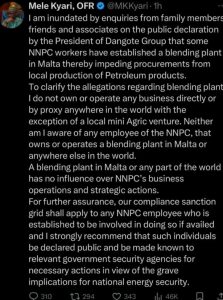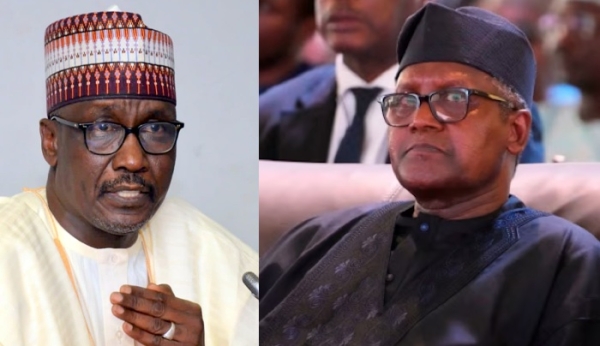The Group Chief Executive Officer (GCEO) of the Nigerian National Petroleum Company Limited (NNPCL), Engr. Mele Kyari, has categorically denied that the oil company owned a blending plant in Malta.
The refuttal came in response to claims made by businessman Aliko Dangote that NNPCL officials were operating an oil facility on the Mediterranean Island.
LEADERSHIP reports that Dangote, while addressing the leadership of the House of Representatives on July 22, claimed that apart from NNPC personnel, oil traders and terminals have established a blending plant in Malta. An oil blending plant, unlike a refinery, blends re-refined oil with additives to produce finished lubricant products.
But, the NNPCL boss took to his X handle (formerly Twitter) on Tuesday to debunk the claims.
Kyari wrote: “I am inundated by enquiries from family members, friends, and associates on the public declaration by the President of Dangote Group that some NNPC workers have established a blending plant in Malta, thereby impeding procurements from local production of petroleum products.
“To clarify the allegations regarding the blending plant, I do not own or operate any business directly or by proxy anywhere in the world, with the exception of a local mini agric venture. Neither am I aware of any employee of the NNPC who owns or operates a blending plant in Malta or anywhere else in the world.”
He further asserted that such a plant in Malta or anywhere globally has no influence over NNPC’s business operations and strategic actions. “A blending plant in Malta or any part of the world has no influence over NNPC’s business operations and strategic actions,” he added.
Kyari also underscored the company’s commitment to compliance and accountability. “For further assurance, our compliance sanction grid shall apply to any NNPC employee who is established to be involved in doing so if availed, and I strongly recommend that such individuals be declared public and be made known to relevant government security agencies for necessary actions in view of the grave implications for national energy security,” he concluded. [LEADERSHIP]
Kyari Denies Dangote’s Claim Of NNPC Workers Operating Blending Plant In Malta
